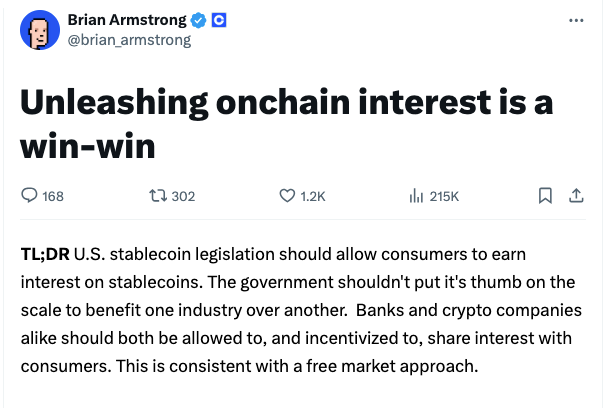Source: Cointelegraph Original: "{title}"
Coinbase CEO Brian Armstrong has called for the U.S. to amend regulations to allow stablecoin holders to earn "on-chain interest" from their holdings.
In a post on the X platform on March 31, Armstrong argued that cryptocurrency companies should receive treatment similar to banks, "being allowed and encouraged to share interest with consumers." He added that allowing on-chain interest "aligns with the free market approach."

Source: Brian Armstrong
Currently, there are two federal stablecoin bills in the legislative process in the U.S.: the "Stablecoin Transparency and Accountability Act" (STABLE Act) and the "U.S. Stablecoin National Innovation and Establishment Act" (GENIUS Act).
Regarding stablecoin legislation, Armstrong stated that the U.S. has the opportunity to "create a fair competitive environment, ensuring these laws pave the way for all regulated stablecoins to offer interest directly to consumers like savings or checking accounts."
Armstrong believes that while stablecoins have found a suitable market through "digital dollars and other fiat currencies," adding on-chain interest would allow "ordinary people and the U.S. economy to reap comprehensive benefits."
He noted that if regulations permit stablecoin issuers to pay interest to holders, U.S. consumers could earn about a 4% yield from their stablecoin holdings, significantly higher than the average interest yield of 0.41% for consumer savings accounts mentioned by Armstrong for 2024.
Armstrong also stated that on-chain interest could promote the overall economic development of the U.S. by incentivizing global use of dollar stablecoins. According to the Coinbase CEO, this could drive increased usage, "redirecting dollar funds to U.S. Treasury bonds and expanding the dollar's dominance in an increasingly digital global economy."
He further argued that higher yields compared to traditional savings accounts mean "consumers have more earnings in hand to spend, save, and invest, thereby driving economic growth in all regions holding stablecoins."
"If we do not open up on-chain interest, the U.S. will miss out on billions of dollars in stablecoin users and trillions of dollars in potential cash flow," Armstrong added.
Currently, neither the STABLE Act nor the GENIUS Act provides legal permission for stablecoins to generate on-chain interest. In fact, the STABLE Act, in its current form, includes a provision that prohibits "paying stablecoin" issuers from paying returns to holders.

Source: STABLE Act
Similarly, the recently passed GENIUS Act in the Senate Banking Committee with an 18 to 6 vote has also been amended to exclude interest-bearing instruments from the definition of "paying stablecoins."
Regarding the status of the STABLE Act, Congressman Bryan Steil stated in an interview with Crypto in America podcast host Eleanor Terrett that the differences between the House and Senate are mainly textual rather than substantive, and that the two bills will "converge" after several rounds of draft revisions.
"Ultimately, I think everyone realizes we need to work with our Senate colleagues to push this bill through," Steil said.
Related: As Trump’s tariff policy approaches, stablecoins and tokenized assets gain favor.
免责声明:本文章仅代表作者个人观点,不代表本平台的立场和观点。本文章仅供信息分享,不构成对任何人的任何投资建议。用户与作者之间的任何争议,与本平台无关。如网页中刊载的文章或图片涉及侵权,请提供相关的权利证明和身份证明发送邮件到support@aicoin.com,本平台相关工作人员将会进行核查。



